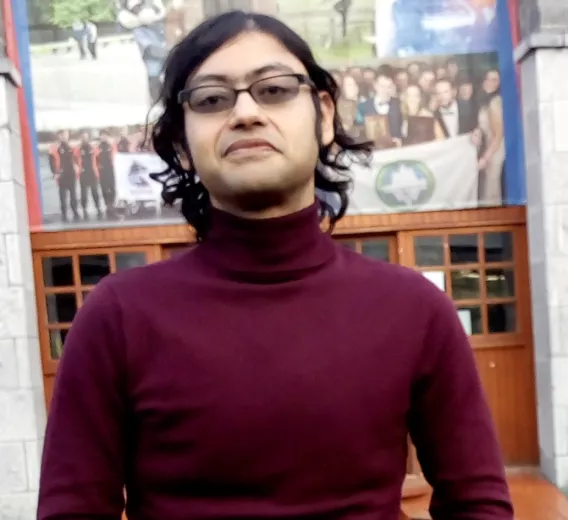Course Details
Contact(s):
Apply Now
Read instructions on how to apply
Express InterestRegister your interest here for more information or to be notified when applications are open.
Brief Description
The MSc Applied Physics is a calendar year programme intended for graduates of physical science and engineering. UL Physics works with companies such as Analog Devices, COOK Medical, Intel, Seagate and BorgWarner. This engagement advances science, develops new products and processes, and creates employment opportunities for our graduates.
The course is delivered by researchers at the cutting edge of next generation technologies. They have an outstanding track-record in producing scientific publications, and intellectual property, in materials for battery and energy harvesting, photonics devices, non-linear optics and imaging, atomistic simulations, 2D-materials, and medical devices.
Our researchers are members of the Bernal Institute at UL which is one of the leading research institutes in Ireland, and have a tradition of experimental development, calibration, and validation that is transferred to our graduates.
The Bernal Institute houses nationally unique scientific infrastructure for the preparation and characterization of novel materials and components. The Bernal laboratory of advanced microscopy houses the FEI Titan Transmission Electron Microscope, which is run by Professor Ursel Bangert, a world leading microscopy researcher, as well as the newly established Actuate Lab, led by ERC awardee Dr. Sarah Guerin.”
The objective of the MSc Applied Physics programme is to meet the needs of graduates who wish to increase their skills with an understanding of applied physics and knowledge of the physical principles underlying material properties, and the operation of processes and equipment, for the research and high technology sectors.
The 1 Year MSc involves course work which extends over two trimesters and a work project which is carried out on a part-time basis in trimester 1 and 2 and on a full-time basis in the final summer trimester. A passing grade in the entire project element will be a requirement to graduate with a MSc award. The modules are delivered over 5 trimesters in the 2 Year part-time programme.
| Autumn | Spring | Summer |
Students to choose 4 modules from electives below
|
Students to choose 4 modules from the electives below
|
|
Content of modules can be found by using the search option on the book of modules.
Normally a 2.2 Hons Degree (Level 8 - National Qualifications Authority of Ireland) in an appropriate Scientific or Engineering discipline (e.g., Physics, Chemistry, Materials, Nanotechnology, etc.). Applications from other graduates who have a sufficient mathematical element in their primary degree in addition to other relevant technical background are considered as well. The programme is also successful with graduates from BSc of Science with concurrent Teacher Education programmes.
- A copy of your birth cert or passport
- Qualification transcripts and certificates
- If your qualifications have been obtained in a country where English is an official language this will suffice
- If this is not available, the following additional documents must be provided:
- English translation of your qualification(s)/transcripts AND
- English language competency certificate
- Please click here for Further Information on English Language Requirements
EU Full-Time EU - €7,900 - Part-Time TBC*
Non- EU - €20,100 - Part-Time TBC*
*Please not year 2 fees are subject to change
Further information on fees and payment of fees is available from the Student Fees Office website. All fee related queries should be directed to the Student Fees Office (Phone: +353 61 213 007 or email student.fees.office@ul.ie.)
Career opportunities exist throughout the high technology sector of industry, including microelectronics, instrumentation, medical technology, and information technology, employers include Analog Devices, Intel Corporation, Harris, IBM, Nortel and Boston Scientific.

Saikat Bhowmick - “Hi, I am Saikat Bhowmick from India. I completed my Master’s degree in Applied Physics with First Class Honours, from the University of Limerick (UL), Ireland in 2018. After that, I did a Research Masters in chemistry and nanotechnology under the supervision of Professor Kevin Ryan and Dr. Ning Liu at the prestigious Bernal Institute at UL.At present,I am pursuing my PhD in Fluid Dynamics (School of Engineering) at UL under the supervision of Professor Harry Van Den Akker.
There are various reasons for choosing the MSc in Applied Physics course at the University of Limerick. I had a good background in fundamental physics from my previous education and degrees. But, I wanted to gain specialized knowledge in the field of Applied Physics. I found that the MSc in Applied Physics course at UL was perfect for me. I took several modules on highly interesting topics like nanotechnology, the physics of medical instrumentation, and condensed matter physics, to name a few. The fact, that there is special emphasis on the application of the material learnt in class, in the form of tutorials, assignments, etc., makes this course quite different from others of its kind.
Another reason why I chose this course was the fact that there is a perfect combination of taught modules and research in this course. I was interested in nanotechnology and electron microscopy and was fortunate to do my taught Masters Research Project at the prestigious Bernal Institute under the supervision of Professor Ursel Bangert. I was allowed to use the highly sophisticated facilities of the Bernal Institute including the JEOL Transmission Electron Microscope, for my taught Master’s Research Project.
The professors and teachers in the Physics Department of UL are excellent and are all eminent researchers in their field.I learned a lot from them both during the classroom lectures and outside as well. All were very friendly, helpful, and accessible.
Lastly, I would like to mention that UL is a wonderful place for studying. The campus is really vibrant and beautiful and there are lots of fun activities and events on the campus.
I would highly recommend this Master’s in Applied Physics course to anyone
who is thinking of gaining a thorough knowledge about applied physics and I sincerely think that pursuing this course has helped me a lot in following a successful career in research.”